
No. 8, 2022 | 30 June 2022
Go to:
From FRSA's Executive Director
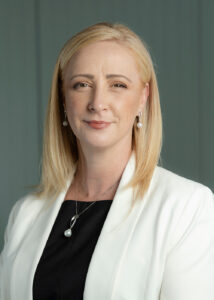
The new Federal Government has certainly hit the ground running and is wasting no time to deliver on Labor’s election commitments. Moves to abolish the cashless debit card are well underway, and the increase to the minimum and award wages came as a welcome relief to many as individuals and families struggle to meet the soaring cost of living. While the incoming Government did not commit to increasing income support payments, we remain hopeful that the October Budget will provide for an increase for income support recipients, who are struggling more than ever to meet basic needs.
The wage increase, of course, places significant financial pressure on social services organisations who are delivering Government funded programs. FRSA members delivering programs under the Families and Children Activity have seen funding decline, in real terms, over the past several years. We know from the CIE Report we published in 2020, that our members are close to, or at, the efficiency frontier. There is limited, if any, scope to achieve further efficiencies and funding this much-needed wage increase will be tricky. We are working hard, along with others in the social services sector, to ensure that the increase in wage costs is reflected in indexation.
It’s not just our new Government that appears to be busy and intent on making improvements. Earlier this week, the Department of Social Services Community Advisory Group, which is made up largely of national peak bodies across the social services sector, met face to face in Canberra. Part of the day was spent taking stock of what the group had achieved since it was established in 2014 and reflecting on its purpose moving forward to ensure that the wealth of expertise and experience in the room is used as effectively as possible to inform strong social policy development. At the same time, DSS is undertaking an internal review of the grants cycle, looking at ways to improve the process and build stronger relationships with grant recipients. We have greatly appreciated our conversations with DSS on this topic, which have been open, receptive and thoughtful.
New initiatives are happening here at FRSA too! I am delighted to announce that with the support of the Australian Institute of Family Studies, FRSA will be establishing online Communities of Practice (CoPS) for providers of five services funded by the Department of Social Services under the Families and Children Activity (see more below). To this end, FRSA is recruiting for a project officer to coordinate the CoPs on a one-year, four days per week contract. This position can be undertaken remotely, and we’ll be opening it up to interested applicants across the country. We encourage people in the FRSA network to apply.
Kind regards,
Jackie Brady
FRSA Executive Director
Communities of Practice are coming!
FRSA is excited to announce that we have been funded by the Australian Institute of Family Studies (AIFS) to deliver online communities of practice (CoPs) over the 2022-23 year to Families and Children (FaC) Activity Providers delivering programs funded by the Department of Social Services.
Online CoP sessions will be provided to the following five FaC Activity program areas:
- Family & Relationship Services (FaRS)
- Specialised Family Violence Services (SFVS)
- Family Mental Health Support Services (FMHSS)
- Child & Parenting Services (CaPS)/Budget Based Funded (BBF)
- Communities for Children Facilitating Partners (CFC FP)
We’ll also establish a group for those interested in topics that may cross a number of the above program areas (our Cross-cutting programs CoP!).
CoP discussions will focus on program-wide or systems practice issues rather than therapeutic or support issues arising in the practitioner-client relationship.
More information and a call for expressions of interest to participate in the CoPs will be sent out next week. The Department of Social Services will put an email out to all relevant FaC Activity providers on our behalf.
New Project Officer role at FRSA!
FRSA is looking for a part time Project Officer to help deliver a 12-month pilot of Community of Practice (CoP) sessions for providers delivering family and relationship services under the Department of Social Services’ Families and Children Activity. The pilot will run from 1 July 2022 to 30 June 2023.
Under the guidance of the Manager, Policy and Research, the Project Officer will coordinate and deliver CoP online discussions with service providers delivering family and relationship services under the Department of Social Services’ Families and Children Activity.
The objectives of this project are to:
- enable sharing of information, experience and practice knowledge amongst providers to develop their knowledge, skills and capabilities.
- encourage innovative thinking that arises through shared experience and learning.
- identify challenges common across providers that may require external input/support.
- provide a foundation for the formation of longer-term collaboration between providers to build capability in the sector.
Read the full position description and selection criteria here.
Applications close Friday 15 July 2022. Applications must include a covering letter and address the selection criteria. For more information please contact: Jackie Brady or Robyn Clough @ FRSA on 02 6162 1811 or via email – projects@frsa.org.au
National Coalition on Child Safety and Wellbeing
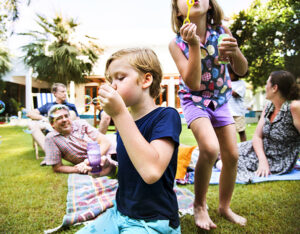 The National Coalition on Child Safety and Wellbeing (the National Coalition), which is convened by Families Australia, met on 22 June 2022 to discuss progress on Safe and Supported: The National Framework for Protecting Australia’s Children 2021–2031. Safe & Supported sets out a national 10-year framework to improve the lives of children, young people and families experiencing disadvantage or who are vulnerable to abuse and neglect.
The National Coalition on Child Safety and Wellbeing (the National Coalition), which is convened by Families Australia, met on 22 June 2022 to discuss progress on Safe and Supported: The National Framework for Protecting Australia’s Children 2021–2031. Safe & Supported sets out a national 10-year framework to improve the lives of children, young people and families experiencing disadvantage or who are vulnerable to abuse and neglect.
The National Coalition comprises over 200 non-government organisations and researchers who are committed to advancing the national campaign on child safety and wellbeing in Australia.
The online meeting brought Coalition members together to hear updates from the Department of Social Services on development of five-year action plans, and perspective and priorities of the Aboriginal and Torres Strait Islander Leadership group, presented by SNAICC–National Voice for Our Children CEO, Ms Catherine Liddle. Two action plans are being developed including – for the first time – an action plan for Aboriginal and Torres Strait Islander Peoples.
To find about more about the National Coalition and the national campaign on child safety and wellbeing in Australia, visit the Families Australia website.
AIFS 2022 Conference
The Australian Institute of Family Studies (AIFS) held its 2022 Conference – Putting Families at the Centre – at the Melbourne Convention and Exhibition Centre from 15-17 June.
The Conference offered a rich and interesting program across a range of subject areas that impact children and families – mental wellbeing and children, innovations in family law, children in out of home care, family violence, supporting parenting relationships, Elder abuse – to name just some.
The Conference was timed perfectly to receive a Ministerial address from the new Minister for Social Services, the Hon Amanda Rishworth! Minister Rishworth emphasised the importance of evidence-informed approaches, talking to families about what’s important to them, and collaborating across portfolio areas.
FRSA was delighted to have an Exhibition Booth at the Conference and chat with delegates about the work of the family and relationship services sector, as well as connect and learn through attendance at a number of the Conference sessions.
FRSA congratulates AIFS on an engaging and successful conference.
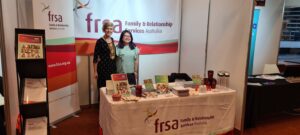
FRSA National Conference 2022 Presentation slides now available
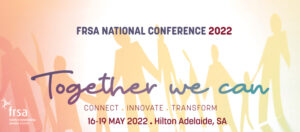
The FRSA Conference, held in Adelaide in May, showcased the great richness and diversity of the sector with over 70 presentations and five symposiums. With permission of presenter, we have made the presentations have made as many presentation slides as possible available via the FRSA Conference page . To access these presentations simply open or download the PDF version of the program and click on the session you are interested in.
Please also take the time to read and share FRSA’s 5th edition of the National Conference e-Journal. The e-Journal presents eight papers covering diverse topics that sit across the following conference themes: Across the lifecourse , Ageing, Family violence, First 1000 days, Relationship breakdown, and Telepractice.
Stay tuned for the recordings of the keynote presentations and panel discussion, which will be uploaded to FRSA’s YouTube channel in the coming weeks.
Child Protection Australia – Latest AIHW Report
 With child protection firmly in the news over the past few weeks, the release of the Australian institute of Health and Welfare’s (AIHW) latest report on child protection is timely. Child Protection Australia 2020-21 presents statistics on state and territory child protection and family support services, as well as selected characteristics of children receiving these services. This includes statistics for 2020–21, and trends over the 5-year period from 2016–17 to 2020–21.
With child protection firmly in the news over the past few weeks, the release of the Australian institute of Health and Welfare’s (AIHW) latest report on child protection is timely. Child Protection Australia 2020-21 presents statistics on state and territory child protection and family support services, as well as selected characteristics of children receiving these services. This includes statistics for 2020–21, and trends over the 5-year period from 2016–17 to 2020–21.
The report found that:
- Australia’s child protection system provided services to 1 in 32 children aged less than 18 years in 2020–21
- Indigenous children on care and protection orders at 30 June increased from about 19,700 in 2017 to about 24,200 in 2021
- 63% of Indigenous children in out-of-home care were living with relatives/kin or other Indigenous caregivers
- Of the approximately 5,400 children reunified, nearly I in 3 (31%) were Indigenous children
- Between 2016–17 and 2020–21, the rate of children subject to substantiations remained stable at 9 per 1,000.
National Framework for Protecting Australia’s Children Indicators
On the same day, the AIHW released updated data on the National Framework for Protecting Australia’s Children Indicators. This release updates data under two indicator sets:
- The National Framework for Protecting Australia’s Children 2009–2020, which includes measures that report on the safety and wellbeing of Australia’s children
- The National Standards for Out-of-Home Care, which are a priority under the National Framework and aim to drive improvements and consistency in the quality of out-of-home care.
The release includes updated child protection indicators, along with a variety of other measures that focus on the safety and wellbeing of Australia’s children.
2021 Census shows changing face of Australia’s 6 million families
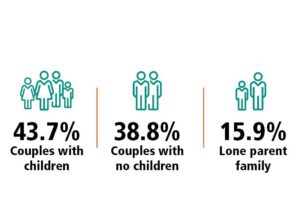 The results of the latest national Census counted nearly 25.5 million people in Australia on Census night. This is an increase of over two million people since the 2016 Census. Australia’s Census count has more than doubled in the last 50 years, with the 1971 Census counting over 12 million people.
The results of the latest national Census counted nearly 25.5 million people in Australia on Census night. This is an increase of over two million people since the 2016 Census. Australia’s Census count has more than doubled in the last 50 years, with the 1971 Census counting over 12 million people.
Household and families:
- The 2021 Census counted more than 5.5 million couple families, of which 53% have children living with them and 47% do not have children living with them. The proportion of couple families without children living with them has been growing steadily, with only 41% of couple families not having children living with them in 1996.
- For the first time, the Census recorded more than a million one parent families, of which four out of every five of those parents were female. As a proportion of families this is increasing slowly, from under 15% in 1996 to nearly 16% in 2021.
Relationships and Marriages:
- 46.5% of Australians over the age of 15 were in a registered marriage, slightly down from the 2016 census percentage (47.7%) and 2011 data (49.2%).
- Following the 2017 amendments to the Marriage Act 1961, which enabled marriage equality, nearly 25,000 same sex marriages were counted in the 2021 Census.
- More than 1.8 million people are divorced and over 600,000 are separated.
- Over one million Australians are widowed and, of these, eight out of ten are female.
More key findings:
- The Census counted more than 800,000 Aboriginal and Torres Strait Islander people, 3.2 per cent of the total people counted. This is an increase of over 25 per cent since 2016.
- Growing numbers of older Aboriginal and Torres Strait Islander peoples, with over 47,000 aged 65 years and over in 2021, up from 31,000 in 2016 and 21,000 in 2011. The median age for Aboriginal and Torres Strait Islander people increased slightly to 24 years in 2021, up from 23 years in 2016 and 21 years in 2011.
- More than 1 million residents arriving in Australia from 2017 to 2021, 83.7% of these arrivals were in 2017 to 2019, before the COVID-19 pandemic.
- Almost half of Australians have a parent born overseas (48.2%) and the population continues to be drawn from around the globe, with 27.6% reporting a birthplace overseas.
- The latest data reveals that, within a very small margin, numbers of Millennials (25-39 years old) have caught up to Baby Boomers (55-74 years old) as the largest generational group in Australia. In the 1966 Census, nearly two in every five people (38.5 per cent) were Baby Boomers.
For further information about 2021 Census data visit www.abs.gov.au/census/find-census-data.

Prime Minister announces Government Secretary appointments
On 22 June, the Prime Minister announced the intended appointments of four new secretaries of Australian Public Service departments:
- Jim Betts will be appointed as Secretary of the Department of Infrastructure, Transport, Regional Development, Communications and the Arts.
- Jan Adams AO PSM will be appointed as Secretary of the Department of Foreign Affairs and Trade.
- Natalie James will be appointed as Secretary of the Department of Employment and Workplace Relations.
- Jenny Wilkinson PSM will be appointed as Secretary of the Department of Finance.
Ms Katherine Jones PSM will continue in the role as Secretary of the Attorney-General’s Department and Mr Ray Griggs AO CSC will continue as Secretary of the Department of Social Services.
The full list of APS Departments and Secretaries as of 1 July 2022 can be found here.
Appointment to the Federal Circuit and Family Court of Australia
On 9 June, the Attorney-General, Mark Dreyfus QC, announced the appointment of Mr Michael Berry SC as a judge of the Federal Circuit and Family Court of Australia (FCFC) (Division 1) as a result of his appointment as a judge of the Family Court of Western Australia (FCWA) on 7 June 2022.
Mr Berry is an accredited family law specialist in aspects of family law matters, including at the trial and appellate level. He was recently appointed as the Deputy Chair of the WA Legal Profession Complaints Committee.
Video available: Reporting outcomes data in DEX
The Department of Social Services (DSS) has published a video on reporting outcomes data in the Data Exchange (DEX) for providers delivering the following grant programs:
- Budget Based Funded
- Children and Parenting Support
- Communities for Children Facilitating Partners
- Family and Relationship Services (including Specialised Family Violence Services)
- Family Mental Health Support Services.
If you have questions after watching the video, please send them to DSS at families@dss.gov.au.

Where you belong - Refugee Week 2022
Last week was Refugee Week on 19-25 June 2022. The week puts a spotlight on the extraordinary people who have come to Australia seeking safety, connection and a new life for themselves and their family.
This year’s Refugee Week theme is “Healing”, which can occur through storytelling, through community and through the realisation of our intrinsic interconnectedness as individuals.
See how FRSA members celebrated the week across the country:
- CatholicCare Victoria shared the story of Chanduru, a participant of their Settle Well program.
- City of Greater Geelong shared a series of videos developed by a group of young people from refugee backgrounds and their perspectives on what mental health is, as well as speaking to members of the community from refugee backgrounds about what this year’s theme of ‘Healing’ means to them.
- EACH staff from their Community Health Service held an afternoon tea.
- Bethany Community Support staff held a fireside chat with locals, Corina and Ntumba, who shared their reflections of being a refugee in Australia.
- Anglicare NT Refugee & Migrant Settlement Support Service’s team invited members of the Ukrainian-Australian Association of the Northern Territory to speak to staff about the fundraising efforts of the local Ukrainian community.
- Catholic Social Services Australia highlighted two employees of CatholicCare Social Services Toowoomba who paved their own path on their journey to Australia and now are giving back to more refugees and migrants within their local community of Toowoomba and South West QLD.
- CatholicCare Social Services Toowoomba highlighted the work of their Toowoomba Refugee and Migrant Support (TRAMS) program.
- PRONIA held a screening of the new film release Akoni on Friday 24 June.
- Upper Murray Family Care held a community celebration on Saturday 25 June.

2022 National Carer Survey
Do you support a family member or friend because of their physical or mental health, a disability, or frailty due to age?
You are invited to share your opinions and experiences in the 2022 National Carer Survey from Carers NSW Australia.
The data collected through this survey will highlight the strengths of carers and also the challenges carers face in caring for a family member or friend. The results will also assist State and Territory Carer Organisations advocate for carers across Australia.
The survey closes 31 July 2022, complete the survey here.
NAIDOC Week
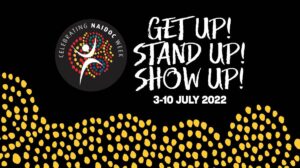 This year’s NAIDOC Week will be held from Sunday 3 July to Sunday 10 July 2022. The week is an opportunity for all Australians to come together to celebrate the rich history, diverse cultures and achievements of Aboriginal and Torres Strait Islander peoples as the oldest continuing cultures on the planet.
This year’s NAIDOC Week will be held from Sunday 3 July to Sunday 10 July 2022. The week is an opportunity for all Australians to come together to celebrate the rich history, diverse cultures and achievements of Aboriginal and Torres Strait Islander peoples as the oldest continuing cultures on the planet.
This year’s theme is Get Up! Stand Up! Show Up! It encourages us all to continue to Get Up! Stand Up! Show Up! for systemic change and support and secure institutional, structural, collaborative, and cooperative reforms.
For more information on how to get involved and resources available, visit the NAIDOC website.
ACOSS/Raise the Rate cost of living survey
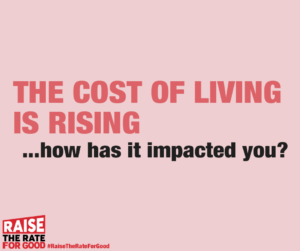 Around the country, we’re seeing increases in the cost of living everything from groceries to gas and electricity. ACOSS has launched a survey to capture the impact that the current cost of living crisis is having on people on income support or pensions to demonstrate just how prevalent this is.
Around the country, we’re seeing increases in the cost of living everything from groceries to gas and electricity. ACOSS has launched a survey to capture the impact that the current cost of living crisis is having on people on income support or pensions to demonstrate just how prevalent this is.
These stories need to be heard and should be at the centre of the conversation about measures to ease the cost-of-living crisis.
Please help to promote the survey by sharing it with your networks. Find out more and share the survey: raisetherate.org.au/cost-of-living-survey
Webinar: Child Mental Health and Wellbeing
1-2-3 Magic® & Emotion Coaching
Five Casework/Counselling exercises to engage anyone about anything – 20-Sep-2024
Engaging Adolescents™
ACT
Project Officer | Family & Relationship Services Australia
NSW
Family Counsellor | Upper Murray Family Care
Group Facilitator | CatholicCare Sydney
Aboriginal Counsellor | Relationships Australia NSW
Counsellors | Relationships Australia NSW
Senior Program Manager – Counselling | Anglicare Sydney
Couple & Family Counsellor | Relationships Australia NSW
NT
Manager Counselling – Family and Relationship Services | Relationships Australia NT
Counsellor (Family and Relationship Services) | Relationships Australia NT
VIC
Centre Manager | Relationships Australia Victoria
2 x Counsellors (Extreme Climatic Events) | Relationships Australia Victoria
Manager – Evaluation and Social Impact | Relationships Australia Victoria
Senior Family Dispute Resolution Practitioner | Relationships Australia Victoria
Family Law Practitioner | OzChild
If you have any events you’d like listed on the FRSA Events and Training Calendar or job vacancies you’d like listed on the FRSA Jobs Board, email Communications Officer, Vanessa Lam at communications@frsa.org.au. Please note that posting onto the FRSA website is reserved for FRSA Members only.

Australia’s mothers and babies | Australian Institute of Health and Welfare
The health of both mothers and babies can have important lifelong implications. In 2019, there were 303,054 babies born to 298,567 mothers in Australia. Explore the characteristics and health of mothers and their babies through interactive data visualisations, and in-depth information and trends on the antenatal period, labour and birth, and outcomes for babies at birth.
This web report also provides information on stillbirths, neonatal and maternal deaths, including causes, maternal characteristics, timing and investigations.
A decade of data: findings from the first 10 years of Footprints in Time | Department of Social Services
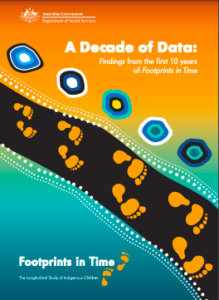 This report follows the developmental pathways of Aboriginal and Torres Strait Islander children focussing on what helps Indigenous children ‘grow up strong’.
This report follows the developmental pathways of Aboriginal and Torres Strait Islander children focussing on what helps Indigenous children ‘grow up strong’.
Better, bigger, stronger: Responding to the mental health care needs of unaccompanied homeless children in Tasmania | Anglicare Tasmania
This report offers insight into the lives of Tasmanian children and young people who experienced homelessness and mental ill-health alone. It also details the experiences of professionals who respond to the complex and competing needs of unaccompanied homeless children.
Tackling abuse of older people: five priorities for the United Nations Decade of Healthy Ageing (2021–2030) | World Health Organization
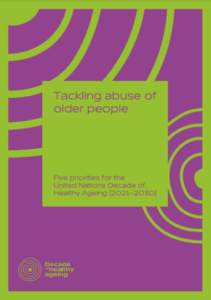 Globally, 1 in 6 people aged 60 years and older experience abuse in the community every year. Rates in institutions are even higher. Yet, abuse of older people remains a low global priority. This document outlines five priorities to prevent and respond to abuse of older people.
Globally, 1 in 6 people aged 60 years and older experience abuse in the community every year. Rates in institutions are even higher. Yet, abuse of older people remains a low global priority. This document outlines five priorities to prevent and respond to abuse of older people.
Australian legal definitions: When is a child in need of protection? | Child Family Community Australia
This CFCA resource sheet provides information for practitioners and researchers on legal definitions of when a child is in need of protection for each Australian jurisdiction. It brings together information from various sources to provide an accessible single reference guide for practitioners and researchers.
New online learning suite: Working with children who have experienced trauma | Emerging Minds
Trauma and adverse childhood experiences – like extreme poverty, abuse, neglect or witnessing violence – are common. In the absence of support, it can disrupt children’s healthy development and increase their risk for health and mental health difficulties now and in the future.
Emerging Minds has developed a suite of free online learning courses and resources to assist different practitioners – from students and volunteers through to specialist practitioners – to understand and support children and families who have experienced trauma.
Adverse childhood experiences and trauma among young people in the youth justice system | Australian Institute of Criminology
This report examines the prevalence of adverse childhood experiences in a representative sample of young people under youth justice supervision in South Australia.
Findings from the 50 Lives 50 Homes program: final evaluation report 2022 | The Centre for Social Impact
The ’50 Lives’ program pioneered the launch of ‘Housing First’ into the homelessness service system and onto the political agenda in Western Australia in late 2015. Fast forward to this final evaluation report, and the ’50 Lives’ collective impact program has supported nearly 300 people, with 73% still permanently housed.
Mental Health, Quality of Life and Coping Strategies in Vulnerable Children During the COVID-19 Pandemic | Better Care Network
This study analysed the consequences after one year of the pandemic on a group of children and adolescents assessed at the beginning of the pandemic in 2020 and to determine the most effective ways of psychologically coping with this pandemic.
Intervention programme for fathers who use domestic and family violence: Results from an evaluation of Caring Dads | Child & Family Social Work
This article details an evaluation of Caring Dads, a men’s behaviour change program trialled in two Australian locations.
Want to submit something to the FRSA eBulletin?
If you have an news item or event that you would like to be featured in a future eBulletin please submit your announcement via the form below or email communications@frsa.org.au with the subject “FRSA eBulletin submission”.
Please note FRSA members receive priority for items posted in the eBulletin. And to keep information current, relevant and useful, submissions will not be repeated from week to week.
Subscribe
Subscribe to receive future eBulletin editions directly to your inbox!






